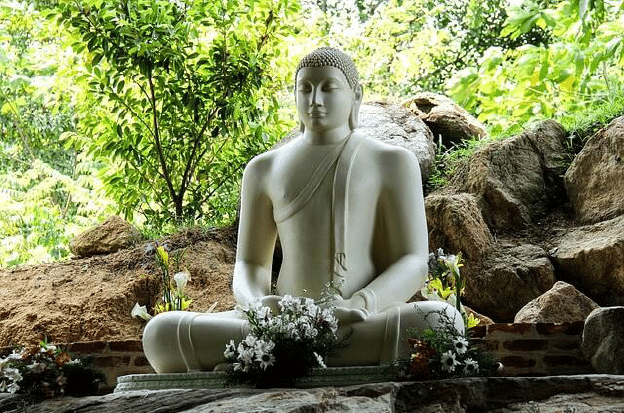India-Sri Lanka Relations - 1 | UPSC Mains: International Relations PDF Download
Sri Lanka is India’s closest maritime neighbor and is just 30 nautical miles away from the territorial boundary. India has deep historical and cultural ties with this island nation.
Background of Sri Lanka and History of Civil War
- Tamils and Sinhalese are the two major ethnic groups In Sri Lanka. Sinhalese eternal conflict with Tamils for power had been gathering strength since before independence.
- Many Tamils attended English language schools which were the passport to higher education and better employment in the colonial period. And the Tamil-dominated Northern Province had comparatively better facilities in terms of education and employment.
- Post independence Sinhalese nationalism sought to curb the Tamil presence in education and civil administration. In 1949 Indian Tamil plantation workers disenfranchised, the start of a wave of Sinhalese nationalism which alienates the Tamil people in the region.
- The passing of the infamous “Sinhalese Only Bill” in 1956 was an another attempt in the same lines.
- The constitutional provisions in the 1972 Constitution favoring the Sinhalese language and Buddhist religion, along with their educational policies convinced many Tamils that they had been perceived as a marginal community.
- As a result of open discrimination, in 1976 Liberation Tigers of Tamil Eelam (LTTE) was formed to fight for Tamil rights and in 1983 Civil war started.
India’s role in Civil war and its implications
- The bilateral relations between India and Sri Lanka deteriorated in 1980’s with a rising of the Tamil militant separatism in Sri Lanka.
- In 1987 with the objective of improving the ties, Indo-Sri Lankan Accord was signed between India and Sri Lanka.
- It proposed a political solution to the Sri Lanka’s conflict by establishing a provincial council system and devolution of power for nine provinces in Sri Lanka. (This is popularly known as The Thirteenth Amendment (13A) to the Constitution
of Sri Lanka)
India also deployed Indian Peace Keeping Force in Sri Lanka intended to perform a peacekeeping (It is known as Operation Pawan, which ultimately resulted in the assassination of PM Rajiv Gandhi).
After two years of constant military engagement, the IPKF was withdrawn as it failed to defeat LTTE.
Finally, in 2009, 25 years of violence ended when Sri Lankan government seized the last area controlled by Tamil Tiger rebels. India at that point of agreed to reconstruct the war-torn areas and started many rehabilitation programs.
However, the pro-LTTE governments in Tamil Nadu influenced the decisions of Central Government which posed a roadblock in humanitarian assistance in Sri
Lanka.
Also, the relationship started deteriorating when India voted against Sri Lanka in 2009, 2012 and 2013 at the US-sponsored UNHRC resolution to investigate alleged human rights violations by the state against the Tamil rebels.
India-Sri Lanka Relations: Areas of cooperation:
Human resource development:
- Sri Lankan students can also appear for National Eligibility cum Entrance Test (NEET) in centers in India for MBBS/BDS admissions. IIT JEE (Advanced) entrance examinations have commenced in Sri Lanka from 2017.
- Prime Minister Modi has announced the extension of the Indian-aided ambulance service to more areas in Sri Lanka.
Indian Community: According to unofficial statistics, it is estimated that around 14,000 Indian expatriates are living in Sri Lanka. Tamil Diaspora are mostly employed in either tea or rubber plantations.
Cultural Relations:
The cultural and trade ties between Sri Lanka is very strong.

- The People of Indian Origin (PIOs) comprise Sindhis, Gujaratis, Memons, Parsis, Malayalis and Telugu speaking persons who have settled down in Sri Lanka and are engaged in various business ventures.
- Though their numbers (10,000 approx.) are much lesser as compared to Indian Origin Tamils (IOTs), they are economically prosperous and are well settled. Each of these communities has their own groups which organize festivals and cultural
events.
The Cultural Cooperation Agreement has been signed between both the countries.
The Indian Cultural Centre in Colombo actively promotes awareness of Indian culture by offering classes in Indian music, dance, Hindi, and Yoga. Every year, cultural troops from both countries exchange visits.
Buddhism is a connecting link between India and Sri Lanka on religious lines.
Education is another important area of cooperation between India and Sri Lanka. India offers scholarship slots annually to deserving Sri Lankan students.
Tourism also forms an important link between India and Sri Lanka. India is the largest source of market for Sri Lankan tourism.
|
88 videos|124 docs
|
FAQs on India-Sri Lanka Relations - 1 - UPSC Mains: International Relations
| 1. What are the areas of cooperation between India and Sri Lanka? |  |
| 2. How do India and Sri Lanka collaborate in trade? |  |
| 3. What is the significance of defense cooperation between India and Sri Lanka? |  |
| 4. How do India and Sri Lanka cooperate in the field of education? |  |
| 5. How do India and Sri Lanka promote cultural and tourism cooperation? |  |
















